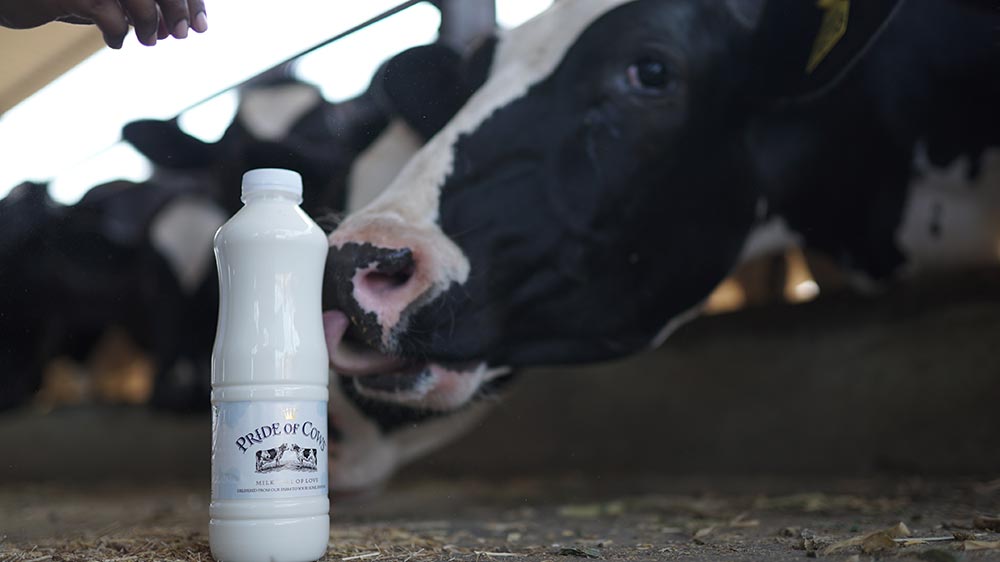
In an e-mail interview with Restaurant India, Akshali Shah, Sr. VP Strategy, Sales and Marketing at Pride of Cows, revealed the number of households her brand has covered across India, how she plans to launch other value-added products under the same brand name such as single origin ghee and fruit yogurt, and what is the road ahead for the brand
The brand ‘Pride of Cows’ was launched first in Mumbai in 2011 and then in cities like Pune, Surat and Delhi. How has been the growth curve so far?
Our country has been facing the issue of adulteration in milk since long. This is an area of serious concern and the awareness about the need to maintain hygiene and purity in milk has been spread well by the Indian media, which has pointed out that 65-70% of milk is adulterated. There also have been measures taken by various government bodies and dairy companies in order to stop the poisoning of milk. One such initiative was taken by Parag Milk Foods Ltd. by launching Pride of Cows in 2011 with a unique ‘farm to home’ (F2H) concept.
The milk is available only through invitation and delivered to the consumer’s doorstep directly from Bhagyalaxmi Dairy Farm, a wholly owned subsidiary of Parag Milk Foods. A premium milk brand, Pride of Cows was launched in South Mumbai with merely 175 customers followed by Pune in 2012, Surat in 2015 and Delhi in 2019. Since its launch we have seen tremendous consumer acceptance for its purity, aroma and freshness. With only word-of-mouth and digital campaigns the company has been able to generate revenues at a CAGR of approximately 30% over FY 2013-18.
Could you tell us the number of households you have covered across India?
After piloting this ambitious project of delivering milk by invitation only in south Mumbai, the company has extended it to other parts of Mumbai, Pune, Surat and Delhi and we are now catering to more than 35,000 households across these four cities.
What are the expansion plans in the offing?
We plan to move to other metro cities like Bangalore, Hyderabad, etc. and cities where we are likely to have airports in the next five years. With this aim to reach out to more metros across the country, we plan to increase the production at our farm.
How has been the volume growth during last two to three years? Looking forward, what is your target growth for this brand?
As mentioned before, Pride of Cows has grown at a CAGR of about 30% and it will continue to grow at this pace. We are also introducing value-added products under the brand Pride of Cows such as breakfast milk which will be filled with fruits, muesli and granola, single origin ghee, yogurt with fresh fruits, etc.
In Mumbai, how many households you can cater to and are you able to put your capacity to full use?
We don’t have numbers for each region. The production capacity of the Bhagyalakshmi Dairy farm is more than 25,000 litres per day.
Also read
https://www.restaurantindia.in/article/the-mainstream-ice-cream-that-we-get-is-basically-a-frozen-dessert.13373
https://www.restaurantindia.in/article/the-road-less-travelled-as-a-tea-sommelier.13374

In conversation with Restaurant India, Amit Anand, Owner at Masala Gully, Gurgaon talks about his delivery only restaurant, why he has added regional dishes to the menu and how he plans to expand it further.
Please explain your concept? Do you operate on centralized kitchen format or do you have multiple kitchens?
We came up with an idea to popularize our regional cuisine at a time when people are focusing more on other international cuisines. There are lots of cuisines in India, which are not mainstream. We have put a few Bihari and Rajasthani dishes in our menu to begin with it. We have tried the original recipe and method of cooking including the authentic cooking vessels, which are used to make it. For example, Champaran Handi Mutton, which is very famous in Bihar and is cooked in Handi with whole spices.
Similarly,"Palak Halwa" which was famous in Bihar almost 100 years back and now rarely any body prepares it. We introduced it in our menu as per out concept. In coming days, we will be introducing more such regional dishes.
Currently we have centralized kitchen but in future we are planning to open up multiple kitchens as we are in expanding and will be including more areas of NCR under delivery.
Do you have your own delivery mechanism or you are registered to aggregators like Swiggy or Zomato?
We have our own software and dedicated delivery team members besides Swiggy and Zomato. These days when people are relying upon technology and social media, it has been a compulsory practice for people like us from the industry to use these technology and social media to reach out to the people. Zomato and Swiggy give a platform to the customer to choose their menu, compare the prices, utilization of the promotion and the knowledge of new launches. They also help us to be seen by customer on their platform if somebody is browsing the list of outlets or cuisine near to them. People also share their review on such platform which helps other customer and outlet as well.
What are the areas you cater to? Are you planning to expand?
Currently, we are delivering around 10 kms in radius of sector 53 in Noida But we also do catering with big corporate names in Gurgaon, Delhi and Noida. We have also extended our services in private parties which we are doing in Delhi/NCR.
Please explain the menu? How many dishes are there? How often you make changes to it?
Our menu represents regional and traditional food items from North Inidia. Recently we added few items from South India as well. As of now we have more than 70 dishes in menu and we are working on some more regional dishes to add them in our menu. We plan to continue with the menu for three months.
How many staffs you have? How do you train them?
We have 15 staffs including four assistants. It is always on the job training especially for the chefs. We share the recipe and give demo of the preparation, ask them to taste, share the video also with them and then they have to create it. Normally staffs take one to two days to get the expected result. For delivery team, we do situation based activities, train them with demo and video for packaging, delivering, share script, training on grooming are also given.

Festivals and celebrations are like excuses to savor upon good food, but not everyone can afford restaurant food. Moreover the body cannot intake restaurant food on daily basis. India’s heart lays in street food the spicy, tangy and oily fast food, which comes in cheaper rates.
A report produced by Research and Markets say that Indian fast food market is expected to grow at a CAGR of 18% by 2020 due to changing consumer behavior and demography.
Fast food market in India is expected to be worth US$ 27.57 billion by 2020.
About 10% of the fast food market in India is organized. NOVONOUS estimates that the organized fast food market in India is expected to grow at a CAGR of 27% by 2020.
In the shortcut life, we hardly have time to waste in taking long routes, compromising quality with quantity or inviting free diseases. To avoid all congestions, we choose to stay indoors, away from traffic, unhygienic street food vendors making unhealthy street food.
This is the reason why technology has taken a great part in enhancing India’s street food business, which is helping a lot of street food startups to erect their business model.
Here are some technological advances, which has linked foodies to street food startups:
Food apps:
Smartphone revolution has been proved as a boon for the street food startup companies. The app culture has helped these street food startups in managing the business as well as to keep a track of their progress.
Foodies can order and pay through app, without waiting in long queues and the best part is they can enjoy their favourite street food in the comfort of their home.
Startups can keep a check on their rivals as well as on the rise and fall in number of customers without getting lost in the sea of street food vendors.
Reviews and Stars:
There are options of reviewing the quality and service of the food through app but there are renowned websites and channels, dedicated to review the food. This helps a lot in gaining credibility and attracting some customers or business space in other cities.
Reviews and stars work as instant feedback. One can further work on the wet patches or leave it as it is to spoil the reputation forever.
Most tourists and travelers read the reviews and check stars for the particular street food before hitting the order button. Moreover these options help customer to get connected with the company if they get to make little changes as per their taste. Taste is a thing, which varies from person to person.
Know About Opportunities:
There are various societies or communities dedicated wholly and solely for street food startups, which organize street food festivals in different states and cities.
If you link your startup with them or join in with them, then you too can take the advantage of participating in street food festivals, where in come a huge crowd, investors, popular chefs and channels.
It gives scope for great coverage, attract investors, and keep you ahead in the game and a guarantee of strong fan base.
Linkups and Breakups:
There are many companies, who offer space on their websites or web pages to those who want to get linked with them in more than one ways.
These spaces are available on rent, where the startups can display an advertisement picture or video, to garner the audiences’ attention, especially the news sites or business sites or any site, which is being frequently checked or where the traffic is always high.
For example if a renowned company wants to through a party for its employees or want to gift vouchers or coupons for any festival, then your connection with them will help your business to reach out to many.
Moreover when you get news of any of your rival breaking up their links with any renowned companies, you can push your best leg forward to occupy that space to your benefit.

In the last two years, India has seen more than a dozen food start-ups coming up with new models and categories. On the one hand, technology-based food startups like foodpanda, TinyOwl, Zomato and other players in the segment are gaining momentum while on the other hand; food delivery startups are coming up with tiffin and healthy or home-cooked food delivery businesses.
Moving with this uncertain growth that is driving the US$13.56 billion Indian food industry growing at a rate of 17 per cent per annum, these companies are getting investors’ attention by raising funds for their expansion in the country and also for strengthening their team.
Gurgaon-based Bite Club Bite Club, a food ordering startup, has raised Rs 3 crore in funding from Powai Lake Ventures, with participation from angel investors including Aneesh Reddy (Capillary Technologies), Ashish Kashyap (Goibibo Group) and Alok Mittal (Canaan Partners). The group is planning to use the raised funds for building technology, growing operations and expansion of the brand.
On the other hand, Chaayos, started in 2013 end, and being operated by two IITians, Nitin Saluja and Raghav Verma, is in talks with Venture Capitalists to raise funds. With eight outlets in Delhi-NCR, the gourmet chai player is planning to tap the Pune, Mumbai and the Bengaluru market by end of 2015.
“We have not yet finalised the deal but are in advance talks with VCs to raise Rs 40 crore which will be used for expansion of the brand, building team and marketing the brand right,” shares Raghav Verma, Co-Founder, Chaayos.
According to experts, food startups are the future of Indian food industry as they know the right nerves of the changing trends and there is a very different excitement happening around this development.
Likewise, Swiggy, a food ordering and delivery company based out of Bengaluru has raised Rs. 12 crore from Accel Partners and SAIF Partners. Founded on the idea to get food delivered for the best restaurants in a neighbourhood, the group has its own fleet of delivery personnel who pick-up orders from restaurants and deliver it to customers.
Commenting on the same, Accel Partners, one of the investor groups in the company says, “Accel Partners, founded in the year 1983 has been committed to helping exceptional entrepreneurs build lasting, category-defining technology companies. Utilising a focused, "prepared mind" approach to investing, we partner with businesses that show potential for significant long-term success in specific sectors.”
Thus, we can see that the scene in the Indian food industry is changing with investors not only willing to invest in the casual dining and QSR segment, but also in food startups, which is gaining momentum these days.
Copyright © 2009 - 2025 Restaurant India.












